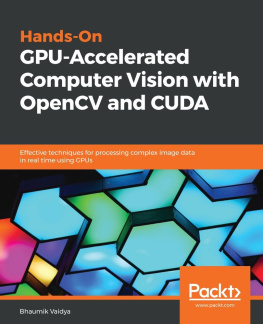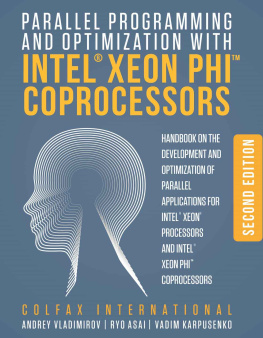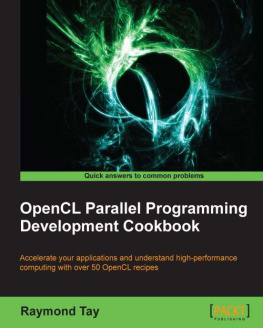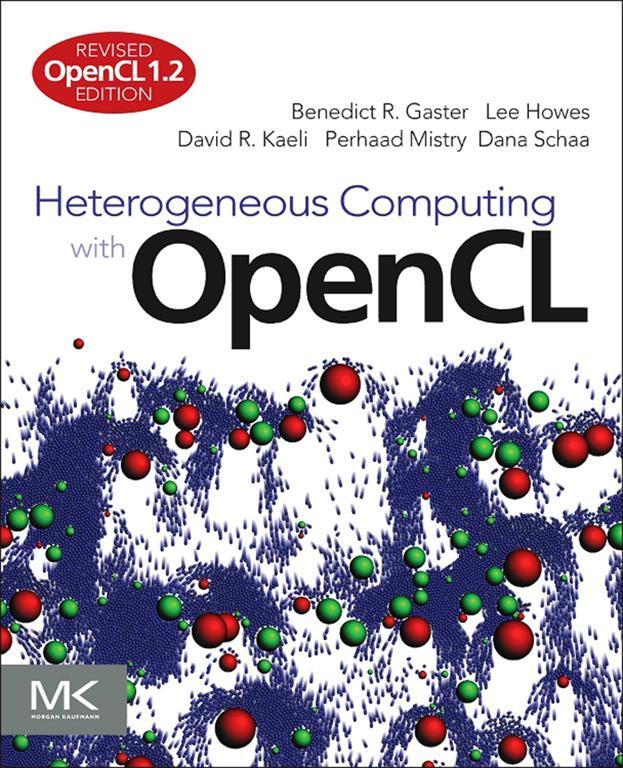Benedict R. Gaster
David R. Kaeli
Copyright
Acquiring Editor: Todd Green
Project Manager: Paul Prasad Chandramohan
Designer: Alan Studholme
Morgan Kaufmann is an imprint of Elsevier
225 Wyman Street, Waltham, MA 02451, USA
2013 Advanced Micro Devices, Inc. Published by Elsevier Inc. All rights reserved.
No part of this publication may be reproduced or transmitted in any form or by any means, electronic or mechanical, including photocopying, recording, or any information storage and retrieval system, without permission in writing from the publisher. Details on how to seek permission, further information about the Publishers permissions policies and our arrangements with organizations such as the Copyright Clearance Center and the Copyright Licensing Agency, can be found at our website: www.elsevier.com/permissions.
This book and the individual contributions contained in it are protected under copyright by the Publisher (other than as may be noted herein).
Notices
Knowledge and best practice in this field are constantly changing. As new research and experience broaden our understanding, changes in research methods or professional practices may become necessary. Practitioners and researchers must always rely on their own experience and knowledge in evaluating and using any information or methods described herein. In using such information or methods they should be mindful of their own safety and the safety of others, including parties for whom they have a professional responsibility.
To the fullest extent of the law, neither the Publisher nor the authors, contributors, or editors, assume any liability for any injury and/or damage to persons or property as a matter of product liability, negligence or otherwise, or from any use or operation of any methods, products, instructions, or ideas contained in the material herein.
Library of Congress Cataloging-in-Publication Data
Application submitted
British Library Cataloguing-in-Publication Data
A catalogue record for this book is available from the British Library.
ISBN: 978-0-12-405894-1
For information on all MK publications visit our website at www.mkp.com
Printed in the United States of America
12 13 14 1510 9 8 7 6 5 4 3 2 1

Foreword to the Revised OpenCL 1.2 Edition
I need your help. I need you to read this book and start using OpenCL. Let me explain.
The fundamental building blocks of computing have changed over the past 10 years. We have moved from the single-core processors many of us started with long ago to shared memory multicore processors, to highly scalable many core processors, and finally to heterogeneous platforms (e.g., a combination of a CPU and a GPU). If you have picked up this book and are thinking of reading it, you are most likely well aware of this fact. I assume you are also aware that software needs to change to keep up with the evolution of hardware.
And this is where I need your help. Ive been working in parallel computing since 1985 and have used just about every class of parallel computer. Ive used more parallel programming environments than I could name and have helped create more than a few. So I know how this game works. Hardware changes and programmers like us are forced to respond. Our old code breaks and we have to reengineer our software. Its painful, but its a fact of life.
Money makes the world go around so hardware vendors fight for competitive advantage. This drives innovation and, over the long run, is a good thing. To build attention for their platforms, however, these vendors help the poor programmers by creating new programming models tied to their hardware. And this breeds confusion. Well-meaning but misguided people use, or are forced to use, these new programming models and the software landscape fragments. With different programming models for each platform, the joy of creating new software is replaced with tedious hours reworking our software for each and every new platform that comes along.
At certain points in the history of parallel computing, as the software landscape continues to fragment, a subset of people come together and fight back. This requires a rare combination of a powerful customer that controls a lot of money, a collection of vendors eager to please that customer, and big ideas to solve the programming challenges presented by a new class of hardware. This rare set of circumstances can take years to emerge, so when it happens, you need to jump on the opportunity. It happened for clusters and massively parallel supercomputers with MPI (1994). It happened for shared memory computers with OpenMP (1997). And more recently, this magical combination of factors has come together for heterogeneous computing to give us OpenCL.
I cant stress how important this development is. If OpenCL fails to dominate the heterogeneous computing niche, it could be many years before the right set of circumstances come together again. If we let this opportunity slip away and we fall back on our old, proprietary programming model ways, we could be sentencing our software developers to years of drudgery.
So I need your help. I need you to join the OpenCL revolution. I need you to insist on portable software frameworks for heterogeneous platforms. When possible, avoid programming models tied to a single hardware vendors products. Open standards help everyone. They enable more than a product line. They enable an industry, and if you are in the software business, that is a very good thing.
OpenCL, however, is an unusually complex parallel programming standard. It has to be. I am aware of no other parallel programming model that addresses such a wide array of systems: GPUs, CPUs, FPGAs, embedded processors, and combinations of these systems. OpenCL is also complicated by the goals of its creators. You see, in creating OpenCL, we decided the best way to impact the industry would be to create a programming model for the performance-oriented programmer wanting full access to the details of the system. Our reasoning was that, over time, high-level models would be created to map onto OpenCL. By creating a common low-level target for these higher level models, wed enable a rich marketplace of ideas and programmers would win. OpenCL, therefore, doesnt give you many abstractions to make your programming job easier. You have to do all that work yourself.
OpenCL can be challenging, which is where this book comes in. You can learn OpenCL by downloading the specification and writing code. That is a difficult way to go. It is much better to have trailblazers who have gone before you establish the context and then walk you through the key features of the standard. Programmers learn by example, and this book uses that fact by providing a progression of examples from trivial (vector addition) to complex (image analysis). This book will help you establish a firm foundation that you can build on as you master this exciting new programming model.
Read this book. Write OpenCL code. Join the revolution. Help us make the world safe for heterogeneous computing. Please I need your help. We all do.






